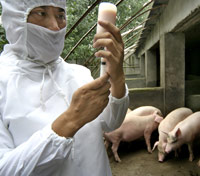K-STATE expert investigates Chinese herd

Millions of Chinese pigs are dying of a newly emerging disease. A Kansas State University virologist, Dick Hesse, travelled with a team of specialists to China recently to investigate.
Since 2006, China’s pig population has been devastated by Blue Ear/High-Fever Disease resulting in the deaths of millions of pigs. The goal of the visit was to assist the Chinese in diagnosing the disease and to enable them to control it.
Real-time PCR – polymerase chain reaction – assays developed at Tetracore and K-State were used to look for and provide rapid laboratory diagnosis of likely viral agents.
The cause of the disease is believed to be a variant form of porcine reproductive and respiratory syndrome.
The team travelled to several farms to collect samples together with prominent scientists from four research centres.
According to Hesse, “the problem in China’s herd appears to be a multifactorial disease complex”. Researchers did find porcine reproductive and respiratory syndrome virus, though not in all cases. The majority of the samples contained more than one type of virus. Classical swine fever virus, porcine reproductive and respiratory syndrome virus and porcine circovirus 2b were most commonly found in diseased pigs.
Need for monitoring
Hesse emphasised the fact that the lack of monitoring of animal disease in China along with the lack of uniform practices among pig producers has lead to the spread of Blue Ear/High-Fever Disease in the country.
“The Chinese need efficacious porcine circovirus vaccines like those available in the US,” he said.
Several biosecurity control mechanisms to hinder the spread of disease were proposed to the Chinese.
Exchange opportunities with Chinese universities and research institutes have also been established.
Dean of the K-State College of Veterinary Medicine, Ralph Richardson, said that such trips highlight the expertise at K-State as well as allow the university to reach out to collaborators.
“Animal and zoonotic diseases don’t recognise geographic borders. Foreign exchange opportunities are one of the best ways to acquaint the veterinarians of tomorrow with diseases they might not see in common practice.”
Related website:











